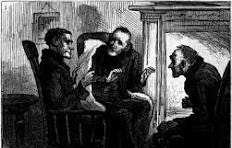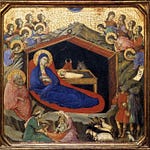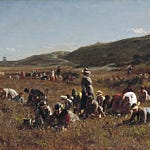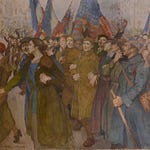Every once in a while, a translator comes upon a word in another language that simply does not have any equivalent in his own. It’s kind of exciting, actually, after you get past knocking your head against the desk. That’s because such a word introduces into your awareness what will strike you as quite a new or odd way of looking at things. That’s the case with what our Word of the Week, mood, used to mean, more than a thousand years ago. A great example of it occurs in a poem called “The Dream of the Rood.” (See my translation and a discussion of the poem here.) The Rood itself, that is, the Cross of Christ, describes to the dreamer how the Lord came boldly to the mount of Calvary, modig in manigra gesyhthe, bold in the sight of many. That’s right: the word modig, which is now our word moody, meant “full of courage, planning things in the mind, brooding on great things.” There’s simply no word in English that will do there.
But if you stop to think about it, where’s real courage to be found? If you get yourself hopped up on drugs so that you can do something mad, something against all odds, that isn’t an example of mood in the ancient sense. You’ve left your brains behind, after all. Hence, as it was supposed, the Turks who murdered people for money were called — to use the English word — assassins, that is, people driven mad by hashish, so that they could do what otherwise they would not. If you are spurred by sudden necessity, so that you’re reacting like a trapped animal, that too would not be mood, because you are not revolving things in your mind; you’re not engaging in strategy; you’re not gathering up all your courage with deliberate intent to act.
A powerful word, don’t you think? Maybe also a word that reveals to us something about realities in the human heart and mind, something we’re apt to forget. There’s a faculty in mankind that lies between the mind and the appetite, the brain and the belly. I’m getting this from Plato, as many of you will recognize — C. S. Lewis talks about it at some length in The Abolition of Man. That faculty, the link between pure reason or intellect, and the desire for bodily pleasures, is — what shall we call it? Drive? Aspiration? Admiration of noble deeds? Heart? Plato’s thymos? How about Old English mod: mood, combining ideas of courage with power of thought, and we hope the combining is for what is high, noble, great, and good. Plato says we ought to think of a charioteer with a team of two horses, one noble, the other wayward. The wayward horse is the appetite. We need it, but it sure is apt to lead us wrong if we allow it. The charioteer is reason, but he’s not going anywhere unless he’s hitched up to the horses. He knows where to go, but they’re the power to get him there. Mostly he must rely on his own intelligence and will to direct them right, and also on that noble horse, the one that seems to breathe fire from his master’s will, and that helps to keep the mischievous horse in check. Let’s just call that noble horse the power of mood.
A funny thing, though — when we now use the word mood alone, we assume it’s going to be unpleasant. Somebody who is moody is, in current usage, prone to sulkiness and gray skies. I’m reading the superb and underappreciated novel Martin Chuzzlewit, and the main character, young Martin, is moody in the new sense, apt to sulk, to think too much about his own poor luck, as when he groans in steerage for six weeks as he crosses the Atlantic to make his fortunes in America, while his attendant and servant, Mark Tapley, is moody in the old sense, determined to use his mind and his heart to get things done, with the additional virtue of being cheerful, without however letting his good mood get on the nerves of Martin. That young fellow has a lot to learn about true courage and friendship, and the irony is that Mark, not by words but by unfailing and patient example, is his unacknowledged teacher.
And what about the word? I’ve got one source that says it has no cousins outside of the German clan, and another that relates it to other words spread all over the Indo-European family, having to do with temperament or mindfulness. For the German, we’ve got Mut, meaning courage, gutsiness, but also Gemuetlichkeit, meaning good humor, such as will give people a fine welcome to your town or your home. For a possible Latin cousin, we’ve got mos, custom, morality, way of life. Anyhow, this “mood” is not related to “mood” in the grammatical sense; that word comes from Latin modus, mode. One of these days I’ll write an explanation of what that term means, but let’s just say I’m in too good a mood to do it now!













